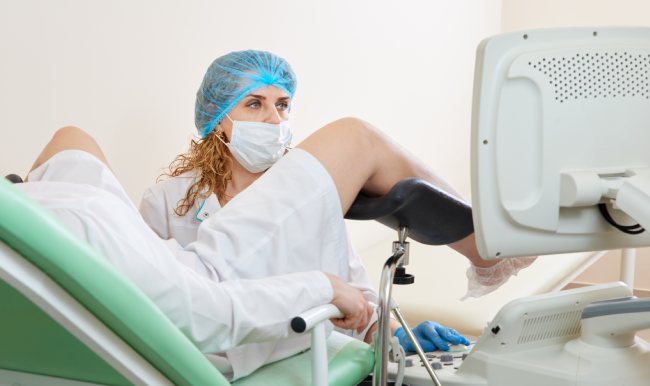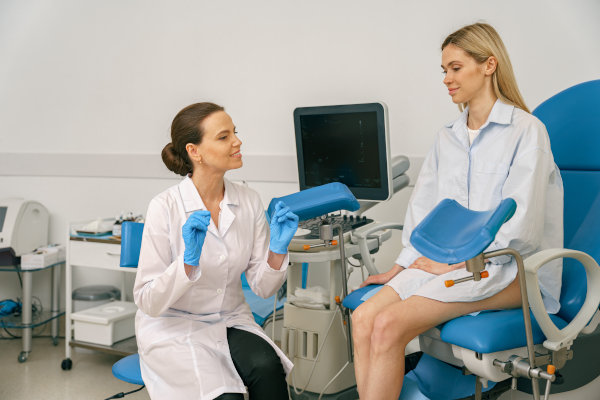Diseases of the vulva and vagina

specialists

equipment

treatment
Types of inflammatory diseases of the female genital organs

Inflammatory processes affect various structures of the female reproductive system. Their classification depends on the location and nature of the inflammation:
- Vaginitis or inflammation of the vagina. The causes are often bacterial infections, fungal infections, and microflora disturbances. Symptoms include itching, burning, foul-smelling discharge
- Vulvitis. Inflammation of the external genitalia is caused by mechanical injuries, allergic reactions to hygiene products, and infections. Manifested by redness, itching, pain
- Cervicitis. Inflammation of the cervix occurs due to sexually transmitted infections. Symptoms are absent or appear in the form of discharge, pain in the lower abdomen
- Endometritis. Inflammation of the uterine mucosa is often associated with abortion and childbirth. Symptoms include fever, lower abdominal pain, abnormal discharge
- Adnexitis. Inflammation of the fallopian tubes and ovaries occurs against the background of infection. Symptoms - pelvic pain, fever, menstrual irregularities
- Bartholinitis. Inflammation of the Bartholin gland, located at the entrance to the vagina, develops as a result of blockage of the duct and infection. Symptoms include tenderness and swelling in the labia area
According to statistics, about 5% of initial visits to a gynecologist are related to pathologies of the vulva. In 75% of cases, long-term treatment is required.
Table: diseases of the vulva and vagina
The table presents the most common pathologies, causes of development, symptoms, and diagnostic methods.
|
Category |
Disease/Pathology |
Symptoms |
Causes/Risk Factors |
Diagnostics |
|---|---|---|---|---|
|
Infectious diseases |
Vulvovaginitis |
Itching, burning, redness, vaginal discharge with an unpleasant odor |
Bacterial infection, Candida fungi, viruses, parasites |
Clinical examination, microflora smear, PCR |
|
Bacterial vaginosis |
White-gray discharge with a fishy odor, discomfort |
Vaginal microflora disturbance, excessive growth of Gardnerella vaginalis |
Smear, KON test, microbiological examination |
|
|
Candida vulvovaginitis |
White curdled discharge, itching, redness |
Reproduction of fungi of the genus Candida with decreased immunity or changes in microflora |
Smear for microflora, cultural examination |
|
|
Trichomoniasis |
Greenish discharge, itching, unpleasant odor, pain |
Trichomonas vaginalis parasite, transmission through sexual contact |
PCR, microscopy of vaginal smear |
|
|
Viral diseases |
Genital herpes |
Blisters, sores, itching, soreness |
Herpes simplex virus (HSV 1 and 2), transmission through contact |
Clinical examination, PCR |
|
Human papillomavirus |
Genital warts, tissue changes |
HPV of high or low oncogenic risk, transmission through contact |
Visual examination, colposcopy, PCR |
|
|
Non-inflammatory pathologies |
Atrophic vaginitis |
Dryness, burning, itching, pain during sexual intercourse |
Lack of estrogen due to menopause, hormonal changes |
Clinical examination, smear |
|
Dermatological diseases |
Lichen sclerosis |
White spots on the vulva, itching, thinning of the skin |
Genetics, autoimmune factors |
Biopsy |
|
Lichen planus |
Red or purple spots, erosions |
Unknown causes, possibly autoimmune origin |
Biopsy |
|
|
Tumor processes |
Vulvar cancer |
Nodules, ulcers, bleeding |
HPV, age over 50 years, smoking |
Biopsy, MRI, CT |
|
Vaginal cancer |
Bleeding, pain, discharge |
HPV, age over 60 years |
Pap test, biopsy |
2 days before the examination, you should refrain from sexual intercourse, the use of vaginal medications, and douching.
Symptoms of inflammatory diseases
Symptoms of inflammatory diseases of the vulva and other external organs
The diseases are characterized by the following symptoms:
- Redness and swelling due to increased blood flow to the affected area
- Itching, burning in the evening and at night
- Pain in the area of the inflamed area, which radiates to neighboring areas, intensifies when walking, sitting, or sexual intercourse
- Discharge with an unpleasant odor
- Dryness, feeling of tightness of the skin
- Painful ulcers or erosions that make hygiene difficult
- Enlarged inguinal lymph nodes
In severe cases, inflammation is accompanied by increased body temperature, weakness, and fatigue.
Symptoms of inflammatory diseases of the vagina and other internal organs
Diseases of internal organs cause the following symptoms:
- Yellow-green, white, thick or cheesy discharge with an unpleasant odor
- Itching and burning in the vaginal area, which intensifies with urination, physical activity, sexual intercourse
- Aching or sharp pain in the lower abdomen, often associated with inflammatory processes in the uterus and appendages
- Frequent and painful urination, which affects not only the vagina, but also the urinary tract
- Bloody discharge outside of menstruation caused by inflammation of the cervix (cervicitis) or damage to the mucous membrane
- Fever, weakness, chills
Inflammatory processes in the ovaries and uterus affect the regularity of the cycle, making it shorter or longer.
Symptoms of inflammatory diseases of the cervix and other pelvic organs
There are a number of signs that you should pay special attention to:
- Purulent, profuse discharge with an unpleasant odor or bloody discharge after sexual intercourse due to inflammation of the cervix
- Nagging or acute pain in the lower abdomen, which intensifies during menstruation, exercise, sexual intercourse
- Burning, pain when urinating, frequent urge to go to the toilet
- Fever and chills, signaling acute inflammatory processes: endometritis (inflammation of the uterine mucosa) or salpingo-oophoritis (inflammation of the fallopian tubes and ovaries)
- General malaise, weakness, decreased performance
- Nausea and vomiting, loss of appetite
Inflammatory processes in the ovaries or uterus reduce libido, lead to increased anxiety, restlessness, and low self-esteem.
Answers to questions
Doctors at the K+31 clinic answered pressing questions regarding diseases of the vulva and vagina.
How are diseases of the vulva and vagina transmitted?
In most cases, diseases are transmitted through direct contact with infected mucous membranes during sexual intercourse and personal hygiene items. Some infections are transmitted from mother to child through the placenta or by passing through the birth canal during childbirth.
What is vestibular papillomatosis?
This is a condition in which small growths appear on the lining of the vulva, resembling small warts. Sometimes this is associated with the human papillomavirus, but it can also be a physiological feature. Most often, the disease passes without symptoms and is discovered by chance. In rare cases, patients complain of burning, pain or discomfort during sexual intercourse. Treatment is required only for discomfort and is usually limited to observation by a gynecologist.
What are the stages of vulvitis and vaginitis?
Vulvitis and vaginitis can occur in different forms: acute inflammation lasts up to a month, subacute inflammation lasts up to three months, and chronic inflammation occurs over a longer period of time.
What signs indicate bacterial vaginosis?
Bacterial vaginosis causes gray-white discharge with a strong fishy odor. The acidity of the vagina becomes higher than normal, and microscopy of the smear shows epithelial cells covered with bacteria.
How to treat bartholinitis?
If the disease is asymptomatic, treatment is not required. It is enough to maintain personal hygiene and lead a healthy lifestyle. If the cyst becomes inflamed and an abscess forms, you can take warm baths to relieve the condition. If necessary, drainage is carried out: the contents of the cyst are removed through a small incision and a catheter is installed to prevent relapses. For complications associated with chronic diseases, antibiotics are prescribed.
How is a Bartholin gland cyst treated?
Treatment of a cyst begins with drainage. The doctor makes a small incision, removes the fluid and installs a VORD catheter - a special device that allows the cyst to heal without the fluid accumulating again. This procedure is performed under local anesthesia and does not require hospitalization. In rare cases, when other methods are ineffective, surgical removal of the gland is required.
Why does itching and burning occur in the vagina after going to the toilet?
The feeling of burning and itching after urination is most often associated with inflammation of the bladder - cystitis. This disease is accompanied by a frequent urge to urinate and irritation in the genital area. Urethritis, an inflammation of the urethra caused by bacteria or viruses, also causes similar discomfort. They provoke vaginal dryness and lead to microtraumas. If urine gets on the damaged areas, the discomfort intensifies.
Who is more likely to experience vulvovaginitis?
Vulvovaginitis often develops in women and girls who are overly keen on hygiene, using laundry soap, potassium permanganate solutions, baking soda, and herbal decoctions. Such products cause chemical burns and cell death, which disrupts the natural balance of vaginal microflora. Beneficial lactic acid bacteria, which perform a protective function, are destroyed, which creates favorable conditions for inflammation and the transition of vulvovaginitis to a chronic form.

This award is given to clinics with the highest ratings according to user ratings, a large number of requests from this site, and in the absence of critical violations.

This award is given to clinics with the highest ratings according to user ratings. It means that the place is known, loved, and definitely worth visiting.

The ProDoctors portal collected 500 thousand reviews, compiled a rating of doctors based on them and awarded the best. We are proud that our doctors are among those awarded.
Make an appointment at a convenient time on the nearest date
Price
Other services














































At the service
Prognosis of vulvar dysplasia is related to the severity of the disease and the period of development of the disease, the presence of associated factors, age indicators and individual characteristics of the patient. In the absence of proper treatment, atypical hyperplasia can progress to oncological pathology. And a mild degree of dysplasia, when detected in the early stages and following the recommendations for appropriate treatment, successfully regresses.
The sooner the visit to the gynecologist follows and the more comprehensive the diagnosis, the more likely a successful recovery. Due to the possibility of relapse, patients with a similar diagnosis are recommended to undergo mandatory monitoring by their attending physician, and in particularly severe cases, additional monitoring by an oncologist.